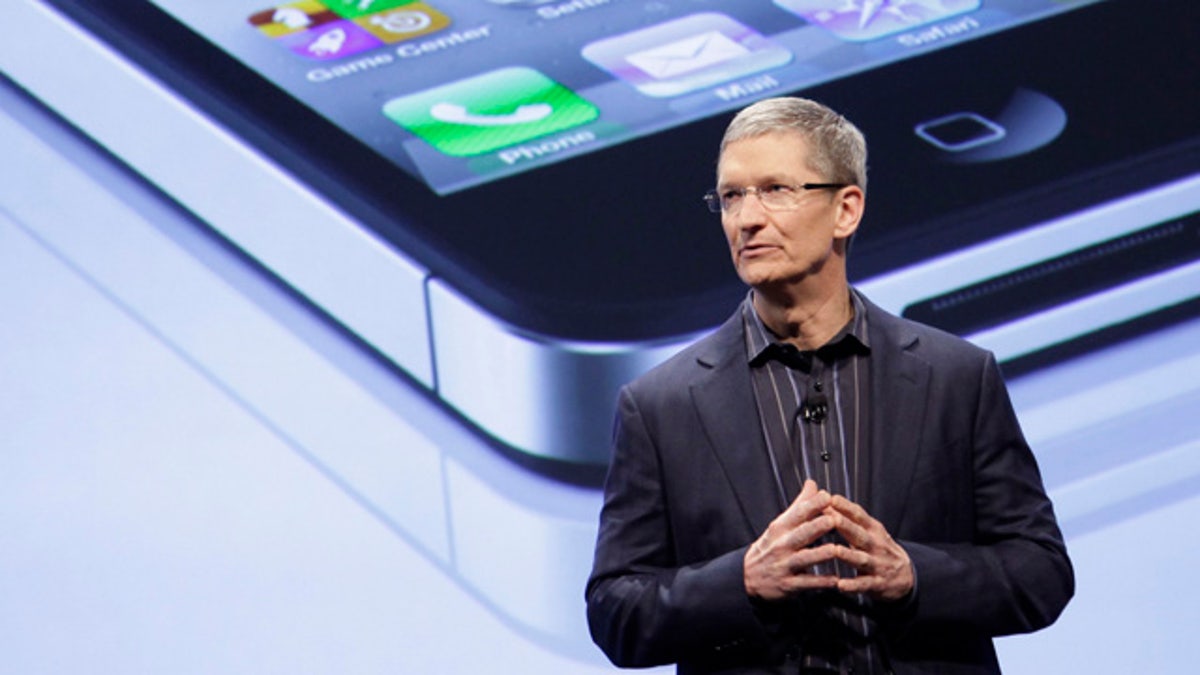
Apple CEO Tim Cook has big shoes to fill. (AP Photo/Mark Lennihan)
Of the various celebrities and pop stars who have achieved household name status, CEOs are hardly included on the list.
Steve Jobs was one of the exceptions.
During his tenure as the head of Apple, Jobs transformed the fledgling tech company into something of a pop sensation, with Jobs as its poster child. Jobs’ keynote speeches -- in which he announced revolutionary products such as the iPod or iPhone -- have long been events comparable to rock concerts, with thousands lining up for hours just to get a glimpse of Apple’s rock star CEO.
So it came as a bit of a shock to the tech world -- and the rest of America, for that matter – when they read the following lines from Jobs’ memo to the company:
“I have always said if there ever came a day when I could no longer meet my duties and expectations as Apple’s C.E.O., I would be the first to let you know. Unfortunately, that day has come.”
Now that Apple’s fearless leader is out of the hot seat, and his successor, Tim Cook, is gearing up to take over, many are now wondering -- will Apple be the same?
Many are scared that the answer is ‘no.’ But overall, the consensus from tech experts is mostly positive. At least for the time being.
“In the short run -- the next two to three years -- the Apple pipeline is so well defined, that I doubt much will change,” Noah Robischon, an executive editor of Fast Company, told FoxNews.com. “But the question is -- what happens to a company after you lose a visionary leader? Does the talent stay? Are you able to innovate the way you did before?”
Many in the tech world have their theories as to why Apple had the amount of success it has had, but the common thread usually involves Jobs’ ability to see his products from the customer’s perspective.
“A lot of tech companies forget that they’re trying to change people’s lives,” Mark Spoonauer, Editor-in-Chief of Laptop Magazine, told FoxNews.com. “Jobs more than any other, understood that. That’s why when you see things like the iPad being advertised, [Apple doesn’t] lead with clock speed or megahertz; it’s more about how it’s going to affect your life. That’s why they’ve been able to ‘out innovate’ the competition.”
And ‘out innovate’ it has.
It’s only appropriate that Steve’s surname is ‘Jobs’ because Apple has seen nothing but growth in the past decade. In September of 2006, Apple had over 20,000 full time and part time employees, a number that has continued to grow over the years with Apple having close to 50,000 men and women in its employ in September of 2010.
The success of the company has almost stood immune to the country’s economic turmoil. But will the loss of Jobs through throw off the momentum?
“I don’t feel like that will change, it’s ingrained in [Apple’s] DNA,” Spoonauer told FoxNews.com. “A lot of people criticize Apple for its closed, walled garden approach. But with Apple, one of the big benefits is that they control both the hardware and software components -- which gives them an advantage over the competition for years to come.”
Now, all eyes are turning to Cook, who took today to address Apple employees.
"I want you to be confident that Apple is not going to change," Cook wrote in an email to employees that was leaked to several tech blogs.
"I cherish and celebrate Apple's unique principles and values. Steve built a company and culture that is unlike any other in the world and we are going to stay true to that-it is in our DNA. We are going to continue to make the best products in the world that delight our customers and make our employees incredibly proud of what they do."
Industry analysts and fans alike will expect Cook keep the momentum going but the comparisons have already started pouring in. Spoonauer predicts that Apple will have to slightly shift its power structure.
“Personalities are going to take a backseat to the products,” Spoonauer told FoxNews.com. “Tim Cook is excellent in terms of his organizational structure. He’s highly analytical, but a lot of people worry he doesn’t have the charisma to follow in Steve Jobs’ footsteps. But Apple has a whole legion of top tier people.”
The key players who are still running the show include Jonathan Ives, the man behind Apple’s iconic design aesthetic, and Scott Forstall, senior vice president of iOS Software. Robischon says Cook needs to focus on keeping the intricate tapestry held together.
“It becomes part of Tim’s job to make sure those people stick around and continue to be the lead innovators,” Robischon told FoxNews.com. “Essentially, Tim doesn’t have the same visionary qualities as Jobs, but part of what he needs to do is foster those within the company.”
Overall, the loss of Jobs isn’t exactly something that other companies haven’t experienced before.
“Bill Gates no longer really runs Microsoft. Warren Buffet is more or less running Berkshire. This isn’t the first time that someone has moved on,” Robischon told FoxNews.com. “So it’s really a question of how the company manages to foster innovation. Building teams that are creative and that aren’t just centered around supply chain management.”
“That’s really a question that every business should be asking.”








































